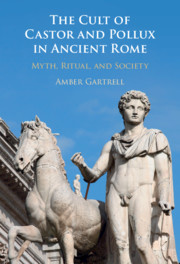Book contents
- The Cult of Castor and Pollux in Ancient Rome
- The Cult of Castor and Pollux in Ancient Rome
- Copyright page
- Contents
- Illustrations
- Translations and Abbreviations
- Acknowledgements
- Introduction
- 1 The Temples of Castor and Pollux
- 2 The Epiphanies of the Dioscuri
- 3 The Responsibilities of Castor and Pollux
- 4 Castor and Pollux as Parallels for Imperial Heirs
- Conclusion
- Bibliography
- Index
2 - The Epiphanies of the Dioscuri
Published online by Cambridge University Press: 08 May 2021
- The Cult of Castor and Pollux in Ancient Rome
- The Cult of Castor and Pollux in Ancient Rome
- Copyright page
- Contents
- Illustrations
- Translations and Abbreviations
- Acknowledgements
- Introduction
- 1 The Temples of Castor and Pollux
- 2 The Epiphanies of the Dioscuri
- 3 The Responsibilities of Castor and Pollux
- 4 Castor and Pollux as Parallels for Imperial Heirs
- Conclusion
- Bibliography
- Index
Summary
Gods were often thought to affect the human world through their actions: responding to vows and oaths; sending signs through auguries and auspices; and, at times, drawing on their power over the mortal realm to ensure a desired outcome. Most chose these more subtle ways of communicating their will to their worshippers, but some took it a step further and manifested themselves in human form, as an epiphany. Castor and Pollux were unusual in the number of their epiphanies: no fewer than nine epiphanies are reported to have occurred in Italy or connected to Roman interests elsewhere in the Mediterranean. These epiphanies are not simply proof of the divine brothers’ power but are also closely bound to the political system of Rome: their first epiphany preserved the Republic at its very inception, while later epiphanies were used to claim the gods’ favour for prominent generals. Further consideration of these epiphanies therefore suggests the variety of perspectives and responses of different individuals regarding interactions between gods and humans.
- Type
- Chapter
- Information
- The Cult of Castor and Pollux in Ancient RomeMyth, Ritual, and Society, pp. 74 - 112Publisher: Cambridge University PressPrint publication year: 2021



